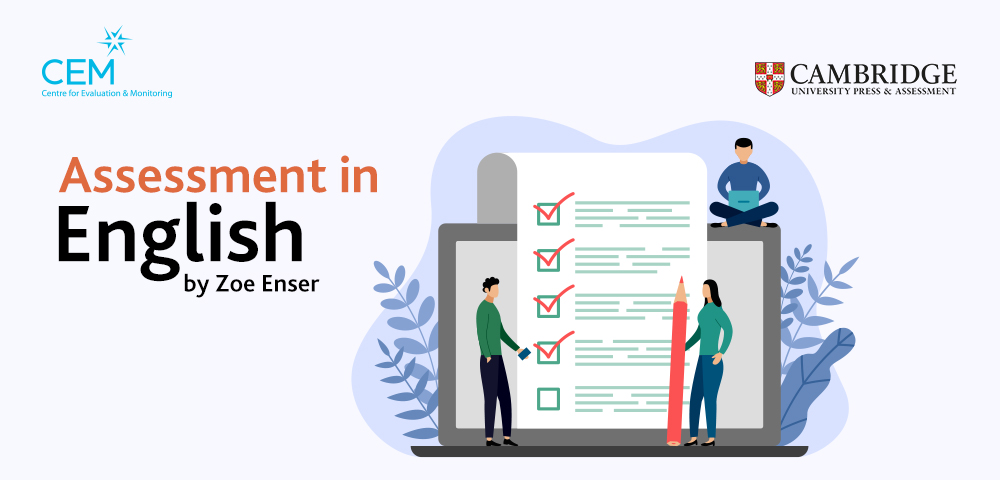Assessment in English
By: Zoe Enser on Nov 25, 2021 10:50:50 AM
4 min read

By Zoe Enser
Assessment is one of the most important things we do in the classroom. It is part of the ongoing dialogue between teacher and learner and provides rich information about what has been learned, where misconceptions exist, and what we need to do next.
American psychologist David Ausubel says:
‘The most important single factor influencing learning is what the learner already knows. Ascertain this and teach him accordingly.’ 1
Carefully designed assessment is therefore essential if we are to understand what our students next steps will be.
Noisy Assessments
However, assessment is also one of the most complex things to get right, and something I have found particularly difficult in English, where we have historically used lots of ‘noisy’ assessments. Issues with handwriting, writing fluency and other literacy issues often obscured the valuable data we want to obtain.
Summative assessments can be particularly difficult to look at forensically, frequently modelled on GCSE essay style responses, showing how students can, and can’t use their knowledge in a flexible way. Unfortunately, they don’t always tell us much about the journey and what to do next having mostly be designed to be sat right at the end of the learning sequence.
That is why when I talk about assessment I usually prefer to concentrate on live formative practices, the ones which allow us to respond to students’ needs with greater immediacy, checking what they do know then and there.
But that is not to say we do not need to sometimes take a step back from those valuable day-to-day interactions, see what has been learnt over the longer term and explore what the data might tell us from other kinds of assessments.
So what is good assessment?
Good assessment should surprise us. Whilst it is nice to see that we really understand our students, assessments do more than reassure us we are on track, assessments should challenge some of our assumptions and encourage us to interrogate the learning in a more objective way. It should give us a new angle in which to view it.
Good assessment also needs to be reliable, valid, accurate and have a clear purpose from the outset. What do we really want to know about the learning? How will this type of assessment show me that?
All too often the assessments I used would simply show me what I already knew and probably didn’t need an hour of lesson time, and another two or three hours of marking time, to tell me they didn’t know how to answer the question on structure well or they were a bit unclear about how to write about context.
Good multiple-choice questions and short response quizzes were therefore quite a revelation to me. These weren’t traditionally used much in English and online programs for our subject usually focus on reading ages and comprehension. I found that different forms of assessment also enabled me to sit back and look at some of the patterns in the data for my class, groups within it, and the year group overall.
After good assessment comes questions
I began to ask more questions; what was really being retained across the lessons? Are there particular questions my students found difficult? Is it the same with other classes? What might that tell us about our approach and our scheme of work? Was it a particular piece of knowledge they needed to answer that question which was missing or was the wording of the question the problem? If so, what could I do about that when I saw then next, or in the next term to ensure that wasn’t what threw them if they came across something similar?
By designing these short questions well, I was able to get a much more granular understanding of where key knowledge was embedded and where it needed to be strengthened. It surprised me much more than other types of assessment ever had.
It also allowed me to pay closer attention to the curriculum. If this is now our progression model and all the work that has gone into developing it matters, we need to ensure our students are learning what we need them to learn from it so they can take it with them into next stage. That might not be the main plot points in Animal Farm or Macbeth, although there is value to knowing that too, but it might be how writers use allegory, metaphor, create characters and guide the readers through the text.
This more precise and granular approach has also meant my previously less than enthusiastic attitude to assessment when faced with a pile of 30 papers to mark has shifted. 30 multiple choice tests allow me concentrate on what I need to know most much more quickly.
Effective assessment does and can tell us so much. We just need to ensure we are asking the right questions that allow us to draw the right conclusions.
About the Author
 Zoe currently works as the Specialist Lead Adviser for The Education People, working in schools across Kent to support their development of English provision. She is also an Evidence Lead in Education, working with the EEF as part of their EEFective Kent project in the region and she works for two days a week for the Teacher Development Trust as a specialist adviser.
Zoe currently works as the Specialist Lead Adviser for The Education People, working in schools across Kent to support their development of English provision. She is also an Evidence Lead in Education, working with the EEF as part of their EEFective Kent project in the region and she works for two days a week for the Teacher Development Trust as a specialist adviser.
Prior to this she was an English teacher, Head of English and whole school literacy lead in schools in Essex and East Sussex. She has also been a senior leader, developing teaching and learning and CPD across schools and exploring ways to ensure assessment and curriculum are closely aligned.
Zoe is the co-author of Fiorella and Mayer’s Generative Learning in Action, The CPD Curriculum: Creating Conditions for Growth, and is currently writing a book about teaching Shakespeare called 'Bringing Forth the Bard'. She also writes for a number of other educational publications including The TES and Teach Secondary and HWRK Magazine.
Find the right assessment for you.
Related Posts
A complete and effective assessment cycle
Assessments are a vital part of school life. There are many different types of assessments, they...
Next steps in assessment
"It is critical to conduct learning assessments to evaluate their effectiveness, improve their...
What makes effective assessment?
By Suzanne Crocker, Assessment Standards Manager Information on pupil progress is key to teaching...

